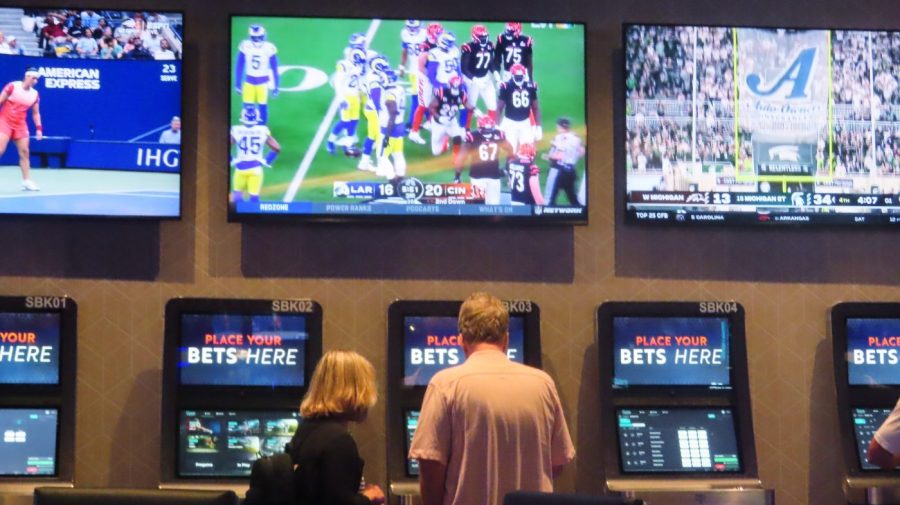
Let’s not call gambling the “hidden addiction” anymore.
The medical, personal and financial wreckage of this condition is right in front of us as we watch the betting line scroll across the screen of sports broadcasts. Those of us who treat patients with problem gambling, as the condition is known, can feel it happening as our phones turn into portable casinos. We can hear it coming as we’re told stories about teens amassing gambling debt.
It’s a race against the clock to offer treatment for problem gambling as a primary addiction in the U.S., because it has become prevalent, accessible and normalized. My colleagues and I are bracing for a public health challenge akin to the opioid epidemic.
We’re seeing individuals face foreclosure and tremendous debt because they’re using mortgage, rent and grocery money to place bets. They feel fearful and without hope as their relationships splinter — not only from financial wreckage, but from the accompanying conditions from which problem gamblers also often suffer: anxiety, depression, and substance use disorders. Nearly 40 percent of people with a gambling disorder will consider suicide.
The demographics of the condition are startling, too. Young adults, particularly young men between the ages of 18 and 24, are more likely to engage in “risky” gambling behavior; teens don’t necessarily view gambling as an activity that can lead to problems. Age, cultural background and socioeconomic status also may contribute to an increased likelihood of developing a gambling problem.
Problem gambling is exploding nationally, to the tune of about 7 million U.S. adults. Some of the same states that have legalized sports gambling have been overwhelmed by increases in calls to their gambling addiction hotlines.
That legalization has helped normalize gambling culture. It’s legal in casinos or at racetracks in 38 states and Washington, D.C., and six states have measures pending to authorize it. Televised sports shows have done their part, too, because we barely notice the “betting line” on our screens. Some sports shows are dedicated entirely to gambling. About $23 billion was spent legally gambling on the last Super Bowl alone.
Of course, gambling goes beyond sports. We visit casinos, buy scratch-off or lottery tickets, bet on horse races, play bingo, and participate in office raffles. Online gambling opportunities are endless.
Many people can treat gambling as a form of entertainment without developing an addiction. But for others, it’s not so simple. People with problem gambling are chasing that dopamine rush — the high associated with every other type of addiction. And, like other addictions, gambling is a societal problem, not just an individual one.
The national annual social cost of this addiction is around $14 billion. That includes gambling-related criminal justice, healthcare spending, job loss and bankruptcy. I’d like to see states weigh that against the relatively modest revenue increases they’ve seen from legalization.
In the meantime, there is nothing modest about how my colleagues and I are preparing for the fallout.
We’re screening more patients for problem gambling, creating starter support groups and applying for state certification to treat gambling as a primary addiction. The federal government, states and individual families have roles to play, too. Lawmakers can take a close look at the Gambling Addiction Recovery, Investment and Treatment Act. If passed, this legislation would dedicate federal funds for programs to prevent, treat and study gambling addiction; support state health agencies and nonprofits that address gambling problems; and invest in best practices, comprehensive research into the condition, and early education about the risks of gambling.
The healthcare workforce needs to know this problem is right on the horizon. Let’s prepare to understand the impact of problem gambling and expand screening across a variety of healthcare settings, so we can identify the condition and intervene early.
When educators and parents discuss the responsible use of phones and social media with young people, they can add problem gambling, and how to obtain help for it, to the conversation. There are numerous apps and other gambling opportunities to track, and we need to keep underage kids from sidestepping age restrictions and parental permission to gamble. The hard truths about social media platforms collecting personal data also apply to gambling apps, as is the reality that gambling apps, like casinos, are specifically designed to keep us betting.
We can all send the message that enjoying sports doesn’t have to include placing bets. Maybe one form of entertainment at a time is enough. Do we need our smartphones beside us as we spectate? Perhaps we can watch games without the betting line.
Gambling now is in plain sight. Labeling it as entertainment doesn’t allow us to help our overwhelmed — and overmatched — patients. There are too many facets of this problem to heal, from accompanying conditions and addictions to financial counseling and relationships. We can’t do that until we’re honest about how normalizing and expanding gambling has contributed this burgeoning addiction.
Heather Hugelmeyer, LCSW, is senior director of behavioral health at Northwell Health, overseeing addiction services at Zucker Hillside Hospital and South Oaks Hospital.
Copyright 2024 Nexstar Media, Inc. All rights reserved. This material may not be published, broadcast, rewritten, or redistributed.
For the latest news, weather, sports, and streaming video, head to The Hill.